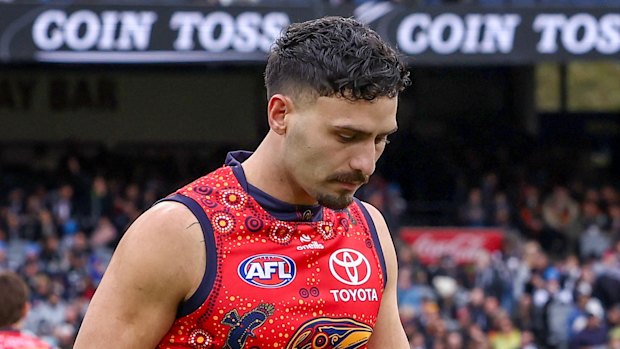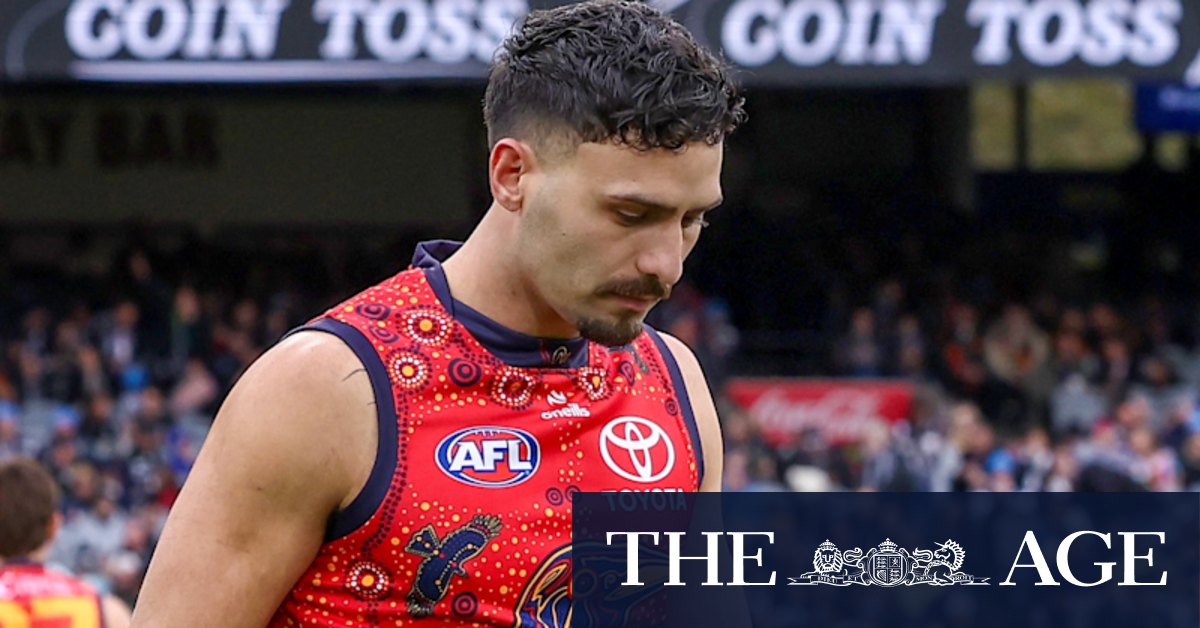“I’m committed to educating myself and being better.”

Izak Rankine has been suspended for making a homophobic slur.Credit: AFL Photos via Getty Images
CEO Tim Silvers said the Crows were extremely disappointed with Rankine’s behaviour and the word he used.
“Such language is unacceptable and at odds with the values of our organisation, and we are committed to being a club that fosters a respectful and inclusive environment,” Silvers said.
“We are obviously frustrated and disappointed, however, player welfare is always a priority and we will provide Izak with the appropriate support and education.”
AFL general counsel Stephen Meade said the language Rankine used was “offensive, hurtful and highly inappropriate”.
“Our players have a very clear understanding of what is acceptable on the football field. Importantly, in this instance it was called out by players and acknowledged by Izak himself as wrong – and that reflects the standards we expect and demand in our game,” Meade said.
Loading
“Izak has said he knew it was not acceptable. Adelaide have said they know it is not acceptable. In an AFL environment, this behaviour is not acceptable. Homophobia has no place in football. The suspension is significant, but stamping out vilification in our game is incredibly important. Everyone in football understands the rules, and there are consequences of breaching them.
“We recognise this is a challenging time for the players and clubs involved, and appropriate support has been offered. But our responsibility is also to every player, official and fan who deserves respect when they come to our game. In 2025, the players know this more than anyone.
“We know people in the LGBTQI+ community and allies hurt when an incident like this happens. One incident of this nature is too many, and the fact there have been multiple this year shows we still have more work to do and we are committed to that.”
The ban means the Crows will be without their most electrifying match-winner for round 24 and the start of their finals campaign. Should the Crows, who have a double chance, lose their first final but make it through to the grand final, Rankine would be able to play in the decider.
Adelaide officials indicated that the club was “highly unlikely” to take the Rankine case to a court outside the AFL, such as the Supreme Court, in a bid to reduce or overturn the suspension.
The Crows are mindful of the need to move on from the Rankine saga and for the playing group to remain focused on their premiership campaign.
The Rankine situation was discussed at a scheduled Adelaide board meeting on Wednesday night.
Rankine called the Magpies player a f—-t, according to multiple competition sources familiar with the incident.
The Crows did not contest the essence of what was said by the star midfielder/forward, but mounted defence for a more lenient penalty.
The AFL said it would continue to consider the specific circumstances in each incident in determining appropriate responses.
‘Long bans on their own will not shift behaviour’
Footy fan and South Australian LGBTQ advocate Joshua Bradley said a mixture of education, transparent processes and fair consequences were needed to help stamp out homophobia in the AFL.
“Progress is real, though the core issue is cultural and starts in community footy,” he said. “We will not change a culture overnight. Clear standards and timely action matter, but long bans on their own will not shift behaviour.”
To address homophobia at a grassroots level, Bradley said parents and players needed to be taught why slurs about sexuality, race, or disability could cause harm to teammates, opponents, families, and the wider community.
“Calling someone a f—ing potato is still abuse and not OK, but calling someone a f—-t harms a whole community that may be listening on the sidelines,” Bradley said.
“Use a simple club language standard, a clear way to call it out in the moment, and a ladder of responses that starts with an apology and reflection, then education or community work, fines where needed, and club penalties for patterns.”
AFL Fans Association patron Jason Ball, an LGBTQIA+ and mental health advocate, said the impact of homophobic language went beyond one player missing games.
“Homophobic language in football does not just affect the person it’s directed at. It creates an environment where LGBTQIA+ players and fans feel unwelcome or unsafe,” he said.
“Many never even get the chance to participate fully in the sport, because they walk away before reaching their potential.”
“As a young footballer, hearing homophobic slurs made me feel like I didn’t belong and kept me from coming out for years. My story reflects what many LGBTQIA+ athletes go through: we love the game, but the culture tells us we don’t belong in it.”
with Hannah Kennelly
Keep up to date with the best AFL coverage in the country. Sign up for the Real Footy newsletter.

